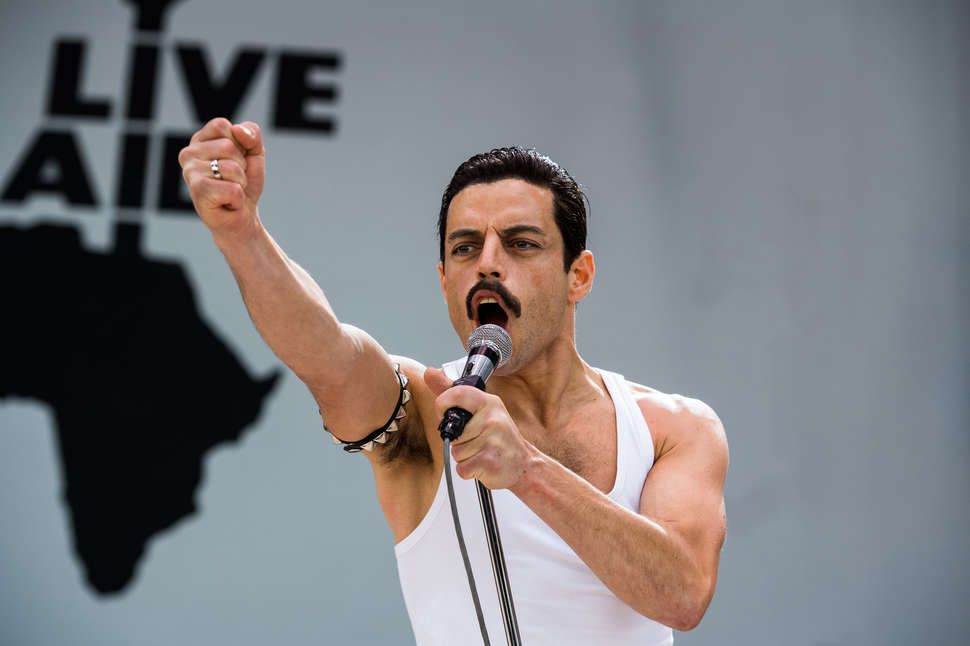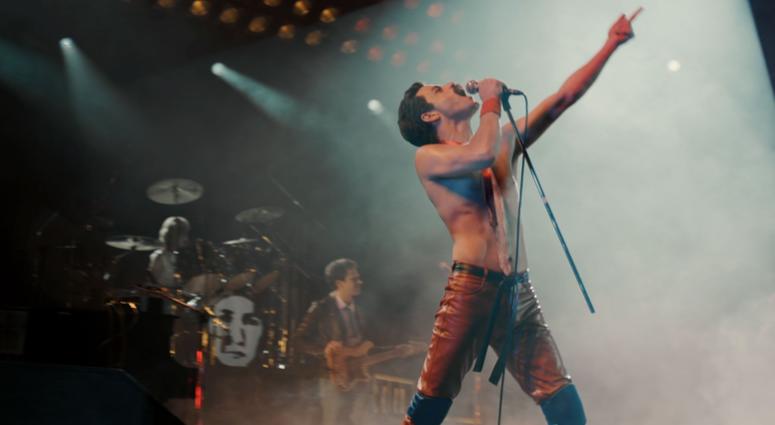Bohemian Rhapsody (2018)
DIRECTOR: Bryan Singer
CAST: Rami Malek, Lucy Boynton, Gwilym Lee, Ben Hardy, Joseph Mazzello, Allen Leech, Tom Hollander, Aidan Gillen, Mike Myers, Aaron McCusker
REVIEW:
Bohemian Rhapsody, obviously taking its title from possibly the most iconic song of the band it chronicles, doesn’t transcend the genre of a standard-issue band biopic, but it’s a breezy and rousing love letter to Queen that rises above some narrative cliches and historical fudging with a committed lead performance by Rami Malek and electric concert sequences. Queen neophytes might not be engaged, but Queen fans should enjoy themselves.
Although ostensibly covering the origins and rise of Queen, Bohemian Rhapsody focuses primarily on the life of its leading man Freddie Mercury. When we open in 1970 London, Farrokh Bulsara (Rami Malek), the son of an Indian immigrant family who indulges a busy nightlife and musical aspirations to the consternation of his traditionalist parents, is working baggage claims at Heathrow Airport when he has a chance encounter with Brian May (Gwilym Lee), Roger Taylor (Ben Hardy), and John Deacon (Joseph Mazzello), members of a smalltime band recently left in the lurch by their frontman striking out for greener pastures. When this gawky, buck-toothed oddball offers himself as a replacement, their initial reaction is dubious, but soon they’re wowed by Farrokh’s pipes and Queen is up-and-coming, as is Farrokh’s newly-crafted persona of “Freddie Mercury”. But even as Queen takes the world by storm, including breaking into a cross-country tour of the United States before rapturous ever-growing crowds, personal tension and infighting grows. Freddie’s engagement to the “love of his life” Mary Austin (Lucy Boynton) falls through when he reveals his bisexuality, and later under the controlling influence of his manipulative manager/lover Paul Prenter (Allen Leech), he loses his way in a haze of flamboyant and decadent drug-fueled parties/orgies, alienates his bandmates, and strikes out on his own with unsatisfactory results. Freddie eventually rejects Paul to pursue a more positive relationship with Jim Hutton (Aaron McCusker) and get the band back together in the nick of time to attend 1985’s massive, all-star Live Aid concert at Wembley Stadium. But there is a cloud hanging over Freddie’s turn-around: he is dying of AIDS.
Bohemian Rhapsody follows the standard-issue rock band biopic narrative structure—band gets together, frontman loses his way in a standard-issue “sex, drugs, and rock and roll” lifestyle and breaks up the band, then undergoes an epiphany and gets them all back together for a triumphant closing reunion—and covers in greatest hits fashion key aspects of Freddie’s life like Queen’s best-known songs, his failed engagement to Mary Austin, his ever-increasingly flamboyant persona, his affairs with men and eventual relationship with Jim Hutton, his AIDS diagnosis, and of course Live Aid. There’s even a convenient “villain” onhand in the person of Paul Prenter, who orchestrates the firing of Queen’s manager John Reid (Aidan Gillen) to insert himself as his replacement and later persuades Freddie to strike out on his own to further isolate him and cement his control. Some accuse the movie of inflating Prenter’s “villainy” to make things more dramatic—though, as the movie portrays, Prenter did indeed “out” Mercury after his firing as manager—but Prenter isn’t around to complain; he passed away in 1991, the same year as Mercury and also from AIDS. Some critics also accuse the movie of having a homophobic double standard in giving heavy focus to Mercury’s romance with Mary Austin while giving his relationship with Jim Hutton short shrift, but in the film’s defense, Mercury wrote the song “Love Of My Life” for Austin and left her the bulk of his assets upon his death, and while Hutton doesn’t have a large role—the movie ends around the time their six year relationship (until Mercury’s death) begins—he is portrayed as a positive influence in Mercury’s life and Mercury’s earlier affairs with men are not ignored (there’s no onscreen sex, but a couple same-sex liplocks and gay party scenes). For the most part, the narrative moves briskly and maintains a breezy “feel good” tone. The portrayal of Freddie is warts-and-all to a point—like many a diva-ish rock star, he can be selfish, erratic, and temperamental—but the movie soft-peddles some aspects, and the other band members are supporting characters who don’t get much individual focus. Considering the surviving members of Queen served as consultants to the production, it’s not surprising the movie doesn’t delve too deeply or darkly into anyone’s negative qualities (apart from Paul Prenter’s) but a dark and gritty biopic isn’t what fans come to a movie like this to see anyway. They come to see rousing reenactments of some of Queen’s most iconic songs—using all original Queen soundtracks, with Rami Malek and others lip-syncing—and a loving ode to their hero(es), and on that level, Bohemian Rhapsody is successful.
Unsurprisingly, the musical sequences are the most electric sections of the movie, none more so than the climactic reenactment of Live Aid. Significant time is devoted to the compositions and creations of songs like “We Will Rock You”, “Love Of My Life”, “Another One Bites The Dust” and of course “Bohemian Rhapsody”. This also allows for a little comic relief, as Freddie’s bandmates are sometimes skeptical of his eccentric visions; they’re particularly dismayed when learning Bohemian Rhapsody will feature an “operatic section”. Ending in 1985 with Live Aid lets the movie go out on a high note—Freddie’s death in 1991 is related via closing subtitles—and the movie takes some liberties with the facts, in particular massaging the timeline to have Freddie discover he has AIDS in 1985 when really he wasn’t diagnosed until 1987, although in the context of the movie’s narrative, it works effectively to propel things toward the finish, when Freddie, suddenly faced with his own mortality, “goes out” with a triumphant bang. The behind-the-scenes production was riddled with turbulence. Early on, the first actor cast as Freddie, Sacha Baron Cohen, quit the production, allegedly over disagreements with the surviving members of Queen over where the movie’s focus should lie and how “warts and all” the portrayal should be. Director Bryan Singer was fired late in production, allegedly because of unprofessional behavior including frequent absences from the set leading to complaints by other members of the crew and star Rami Malek (Singer was replaced for the final two weeks of filming, post-production, and reshoots by Dexter Fletcher, but Director’s Guild regulations meant Singer still ended up with sole directorial credit and Fletcher listed only as an executive producer). The reenactment of Live Aid is the climax and peak of the movie; everything builds toward it. Singer digitally merged the sound from Queen’s performance and footage from the concert with newly-filmed material featuring Malek lip-syncing and the other actors with indistinguishable verisimilitude (attentive viewers may fleetingly glimpse the real Mercury on one of the large video projections to the side of the stage). Unsurprisingly, the movie’s depiction is an abridged version (it leaves out two songs from the concert, “Crazy Little Thing Called Love” and “We Will Rock You”, but both of those are included in other scenes earlier in the movie), but the lengthy fifteen-minute reenactment is the movie’s highlight and allows it to end on a high note.
 Rami Malek (primarily known for the television series Mr. Robot) gives a committed, immersive performance as Mercury. Malek only resembles Mercury up to a point, even with a dental prosthetic to mimic his overbite and eventually donning the signature mustache, but he captures his dynamic, charismatic stage presence, does his best to mimic his every move, and reenacts his concert performances with impassioned gusto. He also effectively plays both sides of Mercury, the socially awkward, soft-spoken, somewhat effeminate private man, and the ever-increasingly flamboyant and over-the-top outer persona. It might be a stretch to say Malek’s performance merits awards consideration, but it’s the most noteworthy thing about the movie. Gwilym Lee, Ben Hardy, and Joseph Mazzello don’t get much focus, but they provide a capable supporting ensemble and are physically well-matched with their real-life counterparts (in truth, Malek’s backup ensemble bears more resemblance to Mercury’s bandmates than Malek does to Mercury himself). Allen Leech has smarm written all over him as our “villain” Paul Prenter. Some recognizable faces pop up in smaller roles, Tom Hollander as the band’s lawyer Jim Beach—whom Mercury dubs “Miami Beach” after declaring his name to be too boring—and Aidan Gillen as their first manager John Reid. Mike Myers makes a heavily made-up cameo as Ray Foster, a bigwig record label executive who is not impressed when Queen unveils Bohemian Rhapsody.
Rami Malek (primarily known for the television series Mr. Robot) gives a committed, immersive performance as Mercury. Malek only resembles Mercury up to a point, even with a dental prosthetic to mimic his overbite and eventually donning the signature mustache, but he captures his dynamic, charismatic stage presence, does his best to mimic his every move, and reenacts his concert performances with impassioned gusto. He also effectively plays both sides of Mercury, the socially awkward, soft-spoken, somewhat effeminate private man, and the ever-increasingly flamboyant and over-the-top outer persona. It might be a stretch to say Malek’s performance merits awards consideration, but it’s the most noteworthy thing about the movie. Gwilym Lee, Ben Hardy, and Joseph Mazzello don’t get much focus, but they provide a capable supporting ensemble and are physically well-matched with their real-life counterparts (in truth, Malek’s backup ensemble bears more resemblance to Mercury’s bandmates than Malek does to Mercury himself). Allen Leech has smarm written all over him as our “villain” Paul Prenter. Some recognizable faces pop up in smaller roles, Tom Hollander as the band’s lawyer Jim Beach—whom Mercury dubs “Miami Beach” after declaring his name to be too boring—and Aidan Gillen as their first manager John Reid. Mike Myers makes a heavily made-up cameo as Ray Foster, a bigwig record label executive who is not impressed when Queen unveils Bohemian Rhapsody.
Ultimately, Bohemian Rhapsody doesn’t transcend the genre, but it succeeds at what it sets out to do, providing a loving nostalgic love letter for Queen fans with meticulous recreations of some of the band’s most iconic moments. If you’re a Queen fan, it represents a trip to the theater worth taking.
* * *
